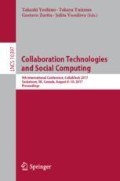Abstract
In multilingual collaboration, a paucity of shared language and gaps in the language backgrounds of group members could bring about imbalanced participation, which is likely to hinder problem solving, idea generation and collaborative learning. This paper proposes a model of best balanced communication based on the Quality of Messages among participants using various languages. We describe a method for selecting the languages to be used with machine translators, and how to create the best balanced communication environment. Currently, many studies on machine translators and balancing conversations have been published, but none have attempted to balance asymmetric participation in multilingual groups. Our vision allows machine translation technologies to enhance the communication between humans with different language backgrounds in terms of balancing their participation. We conduct controlled experiments and find the proposed method successfully enables users to interact and communicate with better equality while minimizing the problems that can arise from machine translation usage.
References
Ishida, T.: Intercultural collaboration and support systems: a brief history. In: Baldoni, M., Chopra, A.K., Son, T.C., Hirayama, K., Torroni, P. (eds.) PRIMA 2016. LNCS, vol. 9862, pp. 3–19. Springer, Cham (2016). doi:10.1007/978-3-319-44832-9_1
David, C.: English as a Global Language. Cambridge University Press, Cambridge (1997)
Henderson, J.K.: Language diversity in international management teams. Int. Stud. Manag. Organ. 35, 66–82 (2005)
Morita, D., Ishida T.: Collaborative translation by monolinguals with machine translators. In: 14th International Conference on Intelligent User Interfaces (IUI 2009), pp. 361–366. ACM, New York (2009). doi:10.1145/1502650.1502701
Yamashita, N., Echenique, A., Ishida, T., Hautasaari, A.: Lost in transmittance: how transmission lag enhances and deteriorates multilingual collaboration. In: 16th ACM Conference on Computer Supported Cooperative Work and Social Computing (CSCW 2013), pp. 923–934. ACM, Texas (2013). doi:10.1145/2441776.2441881
Gao, G., Yamashita, N., Hautasaari, A.M., Fussell, S.R.: Improving multilingual collaboration by displaying how non-native speakers use automated transcripts and bilingual dictionaries. In: 33rd Annual ACM Conf. on Human Factors in Computing Systems, pp. 3463–3472. ACM, Seoul (2015). doi:10.1145/2702123.2702498
Nikolova, S., Ma, X., Tremaine, M., Cook, P.: Vocabulary navigation made easier. In: 15th International Conference on Intelligent User Interfaces (IUI 2010), pp. 361–364. ACM, Hong Kong (2010). doi:10.1145/1719970.1720031
Toyama, T., Sonntag, D., Dengel, A., Matsuda, T., Iwamura, M., Kise, K.: A mixed reality head-mounted text translation system using eye gaze input. In: 15th International Conference on Intelligent User Interfaces (IUI 2010), pp. 329–334. ACM, Haifa (2014). doi:10.1145/2557500.2557528
Aiken, M.: Transterpreting multilingual electronic meetings. Int. J. Manag. Inf. Syst. 13(1), 35–46 (2009). doi:10.19030/ijmis.v13i1.4940
Fellbaum, C.: WordNet. In: Poli, R. (ed.) Theory and applications of ontology: computer applications, pp. 231–234. Springer, Dordrecht (2010). doi:10.1007/978-90-481-8847-5_10
Yamashita, N., Ishida, T.: Effects of machine translation on collaborative work. In: Computer Supported Cooperative Work and Social Computing 2006 (CSCW 2006), pp. 515–524. ACM, Alberta (2006). doi:10.1145/1180875.1180955
Sarda, S., et al.: Real-Time Feedback System for Monitoring and Facilitating Discussions. In: Mariani, J., Rosset, S., Garnier-Rizet, M., Devillers, L. (eds.) Natural Interaction with Robots, pp. 375–387. Knowbots and Smartphones. Springer, New York (2014). doi:10.1007/978-1-4614-8280-2_34
DiMicco, J.M., Pandolfo, A., Bender, W.: Influencing group participation with a shared display. In: Computer Supported Cooperative Work and Social Computing 2004 (CSCW 2004), pp. 614–623. ACM, Illinois (2004). doi:10.1145/1031607.1031713
DiMicco, J.M., Hollenbach, K.J., Pandolfo, A., Bender, W.: The impact of increased awareness while face-to-face. Hum. Comput. Interact. 22(1), 47–96 (2007)
Bachour, K., Kaplan, F., Dillenbourg, P.: An interactive table for supporting participation balance in face-to-face collaborative learning. IEEE Trans. Learn. Technol. 3, 203–213 (2010). doi:10.1109/tlt.2010.18
Bramantoro, A., Ishida, T.: User-centered QoS in combining web services for interactive domain. In: 5th International Conference on Semantics, Knowledge and Grid, pp. 41–48. IEEE Press, Guangdong (2009). doi:10.1109/skg.2009.106
Lafferty, J.C., Eady, P.M., Elmers, J.: The desert survival problem. In: Experimental Learning Methods, Michigan (1974)
Fermilab Project ARISE. http://ed.fnal.gov/arise/guide.html
NASA. http://www.nasa.gov/audience/foreducators/5-8/features/F_Exploration_Then_and_Now.html
Callison-Burch, C., Fordyce, C., Koehn, P., Monz, C., Schroeder, J.: (Meta-) evaluation of machine translation. In: 2nd Workshop on Statistical Machine Translation, pp. 136–158. ACM, Prague (2007). doi:10.3115/1626394.1626403
Linguistic Data Consortium: Linguistic data annotation specification: assessment of fluency and adequacy in translations. Technical report (2005)
Ishida, T. (ed.): The Language Grid: Service-Oriented Collective Intelligence for Language Resource Interoperability. Springer, Heidelberg (2011). doi:10.1007/978-3-642-21178-2_1
Yamashita, N., Inaba, R., Kuzuoka, K., Ishida, T.: Difficulties in establishing common ground in multiparty groups using machine translation. In: SIGCHI Conference on Human Factors in Computing Systems, pp. 679–688. ACM, Massachusetts (2009). doi:10.1145/1518701.1518807
Acknowledgements
This research was partially supported by a Grant-in-Aid for Scientific Research (A) (17H00759, 2017-2020) from Japan Society for the Promotion of Science (JSPS), and the Leading Graduates Schools Program, “Collaborative Graduate Program in Design” by the Ministry of Education, Culture, Sports, Science and Technology, Japan.
Author information
Authors and Affiliations
Corresponding author
Editor information
Editors and Affiliations
Rights and permissions
Copyright information
© 2017 Springer International Publishing AG
About this paper
Cite this paper
Pituxcoosuvarn, M., Ishida, T. (2017). Enhancing Participation Balance in Intercultural Collaboration. In: Yoshino, T., Yuizono, T., Zurita, G., Vassileva, J. (eds) Collaboration Technologies and Social Computing. CollabTech 2017. Lecture Notes in Computer Science(), vol 10397. Springer, Cham. https://doi.org/10.1007/978-3-319-63088-5_11
Download citation
DOI: https://doi.org/10.1007/978-3-319-63088-5_11
Published:
Publisher Name: Springer, Cham
Print ISBN: 978-3-319-63087-8
Online ISBN: 978-3-319-63088-5
eBook Packages: Computer ScienceComputer Science (R0)

